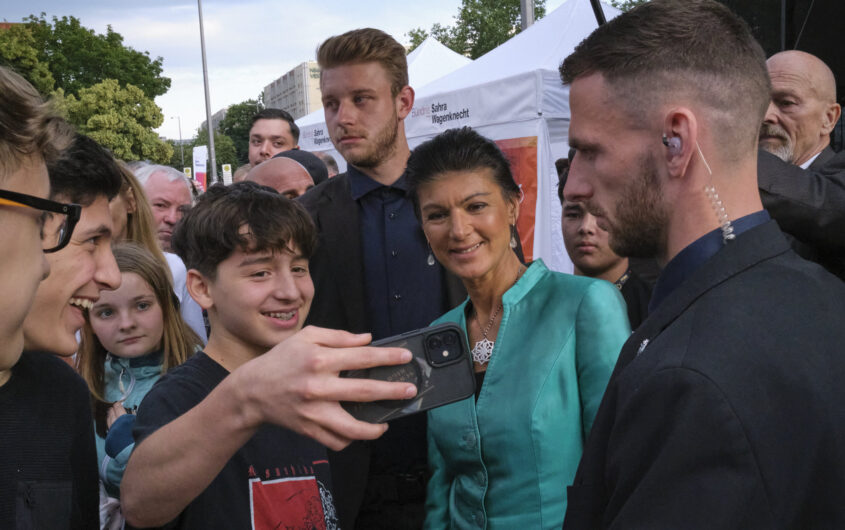
Matthias Berg via Flickr
Should the AfD be Worried about the BSW?

Kiana Bussa
Halle Foundation/AGI Intern
Kiana Bussa is a research intern at AGI in summer 2024. Ms. Bussa is an undergraduate student at the University of Georgia where she majors in International Affairs and minors in International Human Rights and Security and Data Analytics for Public Policy. At UGA, Ms. Bussa has conducted independent research with the GLOBIS Human Rights Research Lab and developed policy-related skills in the Security Leadership Program with the Center for International Trade and Security. In her spare time, she debates with the Phi Kappa Literary Society.
The cracks in the Left Party’s foundations finally gave away when Sahra Wagenknecht, the party’s most recognizable and popular member, withdrew her membership in October 2023 amid widespread belief that Wagenknecht had an interest in forming her own party. This was proved true when the Sahra Wagenknecht Alliance (Bündnis Sahra Wagenknecht, BSW) was formally announced in January 2024. Despite being formed only six months prior, the party did relatively well in the June European Parliamentary elections, shoring up six percent of the national vote. Despite this showing, the question remains how the Sahra Wagenknecht Alliance will shake up German politics in the long term. Can the BSW seriously take on the Alternative for Germany (Alternative für Deutschland, AfD)? This is a central question for pundits, academics, and journalists ahead of the September 2024 state elections.
The BSW depicts itself as a “left-wing conservative” party: culturally conservative, but economically left. In practice, this means the party appeals to German anxieties surrounding immigration, while also supporting a strong welfare state. Sahra Wagenknecht, the BSW’s namesake and leader, has been a vocal critic of the so-called “lifestyle left,” which she says is too preoccupied with “woke” cultural issues to address real issues of stagnant wages, poverty, and housing. Accepting asylum seekers, the party says, is irresponsible and unacceptable when German families are struggling (this argument is deeply flawed but appealing to German voters). On her split from the Left Party, she told reporters, “We decided to establish a new party because we are convinced that things cannot go on as they are at present. Otherwise, in ten years’ time, our country will be unrecognizable.”
On foreign policy, the party claims it is anti-war and supports “conflict resolution,” including immediate peace talks between Russia and Ukraine. The BSW is firmly against supplying Ukraine with arms for defense against Russia and criticized the government’s decision to turn away from cheap Russian energy supply. Wagenknecht has often avoided direct criticism of Vladimir Putin, commenting, “all politicians who start a war are in a way, criminals. But then that doesn’t only apply to Putin, but also to all the U.S. presidents who started wars in Iraq and Afghanistan.” Critics accuse the BSW of being a pro-Russia party (there is evidence that Russia is invested in Wageknecht’s electability). The BSW, like the AfD, skipped Ukrainian President Volodymyr Zelenskyy’s speech to the Bundestag in June 2024.
The BSW is openly challenging the AfD’s popularity and deliberately targeting AfD strongholds ahead of elections in Saxony and Thuringia. The BSW, like the AfD, is an anti-establishment populist party that appeals to protest voters dissatisfied with the political mainstream. The party, in many ways, takes after the AfD. The AfD, originally founded as an anti-euro party in 2013, was transformed into a centrally anti-immigration party following the 2015 swell in refugees in Europe. Similarly, Sahra Wagenknecht was an early critic of Merkel’s immigration policies and worked to pull the party toward anti-immigrant discourse in 2018 with the launch of the Aufstehen (Stand Up) movement. Her split from the Left Party was especially driven by disagreements on immigration policy.
Like many AfD politicians, Wagenknecht has roots in East German politics. She was born in the former East Germany in 1969 and joined the Socialist Unity Party of Germany (SED) shortly before the fall of the Berlin Wall. Later, the party transformed into the Party of Democratic Socialism (PDS) in 1989, which later drew support from eastern Germans frustrated with the privatization of formerly state-owned enterprises. Eventually, the PDS merged with the Electoral Alternative for Labor and Social Justice (WASG) to form the Left Party in 2007, of which Wagenknecht became parliamentary group leader in 2015. Wagenknecht’s roots in East Germany contribute to her popularity in the region. In particular, her self-curated image as a champion of working-class Germans appeals to eastern German feelings of being left behind economically (to which there is some truth).
By mainstreaming anti-immigrant narratives, the BSW actually supports the radical right’s position in German politics and helps erode German media’s normal sensitivity to airing such grievances.
Can the BSW seriously “eat into” AfD’s support? Sarah Wagner, a lecturer in Quantitative Political Science at Queen’s University Belfast, told Deutsche Welle that “much of the AfD’s current support is not particularly committed and so could be won over.” Wagenknecht’s former party, The Left—which nationally brought in 4.9 percent of the vote in 2021, under the five percent threshold for seats in the German Bundestag—has historically been much more successful in eastern German states. This is especially true in Thuringia, where the AfD has gained significant traction under the leadership of the controversial Björn Höcke. In the European Parliament elections, the BSW managed to capture as much as 15 percent of the vote in eastern Germany. As the BSW continues to poll third (sometimes as high as 20 percent of the vote), the BSW forming a part of the government in Saxony and Thuringia is considered a realistic possibility. The BSW has vowed to respect the far-right firewall and said it will not form a coalition with the AfD.
The party has, however, been open to forming a government with the Christian Democratic Union (Christlich Demokratische Union, CDU). Together, a BSW-CDU alliance could upend Höcke and install Katja Wolf, the regional BSW party leader, in government. For its part, the CDU seems undecided and divided on its stance on a coalition with the BSW. In June 2024, CDU national party chair and parliamentary group leader Friedrich Merz suggested that the CDU was completely opposed to cooperation. Mario Voigt, head of the regional chapter of the CDU in Thuringia, however, has seemed more open to the possibility. Voigt recently commented that Germany should pursue more diplomacy in Ukraine, a possible nod toward the BSW. Sahra Wagenknecht had previously pledged to only work with partners who share the BSW’s position on German involvement in Ukraine, even at the state government level. More importantly, if current polling is accurate and the CDU wishes to govern (and shut the AfD out), the CDU might be forced to collaborate with the BSW in Thuringia or Saxony, whether the CDU particularly wants to or not.
While perhaps the BSW is a real challenge to the AfD, is it a real challenge to the radical right? Cas Mudde, professor at the University of Georgia, is doubtful. He argues that while the BSW might manage significant electoral victories in state elections, ultimately Sahra Wagenknecht’s anti-immigrant rhetoric only propels far-right talking points. By mainstreaming such narratives, the BSW actually supports the radical right’s position in German politics and helps erode German media’s normal sensitivity to airing such grievances. Manuel Müller, a European politics expert at the Finnish Institute of International Affairs, comments that the BSW, despite its branding as a left-wing party, has “greater ideological overlap and compatibility with right-wing populist parties.”
The September elections might indicate if the BSW has staying power or is a flash in the pan. Sahra Wagenknecht is a nationally recognizable politician and the subject of considerable media attention. Whether the party can effectively mobilize this attention into an electoral victory (and later, a governing coalition) remains to be seen. Regardless of its ability to form a coalition, the popularity of the BSW alongside the AfD casts a large shadow on the 2025 federal elections. German voters are dissatisfied with the mainstream and seeking alternatives in every direction. This dynamic could fundamentally reshape the German political landscape in the coming years.








